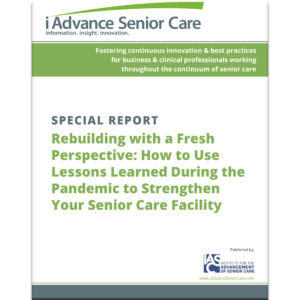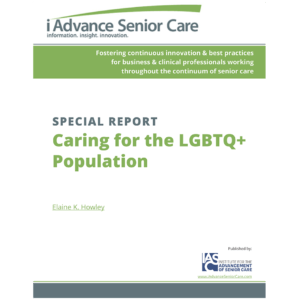How To Prepare for the COVID-19 Vaccine Rollout
 On Thursday, December 10th, a Food and Drug Administration (FDA) advisory panel recommended the approval of Pfizer and BioNTech’s COVID-19 vaccine for emergency use. Emergency use approval of a vaccine developed by Moderna Inc. followed a few days later. Both vaccines require two separate doses for maximum effectiveness.
On Thursday, December 10th, a Food and Drug Administration (FDA) advisory panel recommended the approval of Pfizer and BioNTech’s COVID-19 vaccine for emergency use. Emergency use approval of a vaccine developed by Moderna Inc. followed a few days later. Both vaccines require two separate doses for maximum effectiveness.
To date, the pandemic has killed approximately 290,000 people in the U.S., and more than 15.4 million people have been infected. Nursing homes have been particularly affected. According to CMS data, as of November 29th, more than 377,000 COVID-19 cases had been confirmed in nursing home residents, and more than 76,500 residents had died from the virus. Nursing home staff confirmed COVID-19 cases totaled more than 322,0000, and more than 1,100 staff had died.
Strategies To Prepare To Administer the COVID-19 Vaccines
The FDA recommendation of the vaccines brings the senior care industry one step closer to being able to better protect residents and staff. Now is the time for facilities to develop vaccination programs and to start outlining the logistics of how to implement vaccination throughout their facilities.
The CDC established a Pharmacy Partnership for Long-Term Care Program for COVID-19 Vaccination. This program helps to manage the vaccination process for long-term care facilities. The last day to sign up for the program was November 6th, and facilities must be located within 75 miles of a Walgreens or CVS Pharmacy to participate.
The CDC recommends that facilities that didn’t sign up for the program or that are not located within that proximity contact their state health departments about available vaccine distribution services and vaccination services.
AHCA and NCAL resources can also help facilities prepare. The #GetVaccinated Communications Toolkit contains resources including a vaccine clinic checklist for facilities, tactics for effectively communicating with staff, a template letter for family consent, a social media toolkit, and more.
The Potential Effects of a Vaccine
While vaccines will obviously help protect residents and staff in senior care settings, they may have larger implications for the industry as a whole. COVID-19 vaccines could change public perception of the risk associated with facilities.

Mike McClernon, senior living advisor and owner, Assisted Living Locators of Long Island
“Families and seniors have, in large part, delayed assisted living decision for the past several months,” explains Mike McClernon, Senior Living Advisor and Owner of Assisted Living Locators of Long Island. “Families have been home care for seniors, senior care communities have been tarred with a very broad “danger” brush, homecare companies have filled in some care gaps, and adult children working at home have been able to defer the tough decision about senior placement for a bit.”
While some families have found temporary workarounds to placing a loved one in a senior care setting, those solutions won’t necessarily last long-term. “There is a backlog of families and seniors waiting for assisted living, memory care, and nursing homes to allow full activities within the facilities and full access to visitation,” explains McClernon. “Once this internal and external opening is accomplished, many people who are now on the sidelines, especially for assisted living, will be placing.”
The decision to place family members won’t be immediate, but implementing vaccination programs in senior care settings could begin to build families’ trust in the facilities. “The current plan seems to be to provide the vaccine to seniors in senior living facilities, and to the staff in these facilities, but not necessarily to seniors living at home – at least in the first round,” explains McClernon.
“This will make senior living facilities islands of safety for seniors, and they will have this distinction for months if not longer. If this safety is combined with relatively open visitation and full internal activities, then senior living facilities will indeed be safer than living at home and will be a very attractive alternative for seniors.”
McClernon is quick to note many uncertainties. “We have much to learn about the efficacy of the vaccine in people with diminished immune response, and many of the elderly fall into this category,” he says. “The data also does not tell us how long the immunity conferred by the vaccine will last. I believe that going forward one point of marketing and health differentiation for senior living facilities will be increased environmental controls (better air filtration, for example) and more proactive healthcare within facilities.”
The past year has been both challenging and defining for the senior care industry. With the rollout of multiple vaccines, the industry will have a key tool to help keep residents and staff safe.

Paige Cerulli is a contributing writer to i Advance Senior Care.
Related Articles
Topics: Administration , Executive Leadership , Facility management , Featured Articles , Infection control , Mike McClernon , Operations , Resident Care , Risk Management









